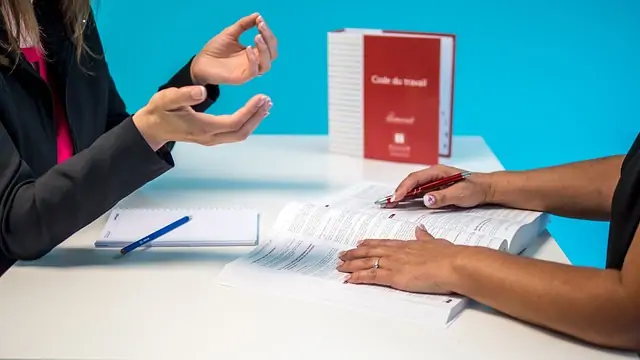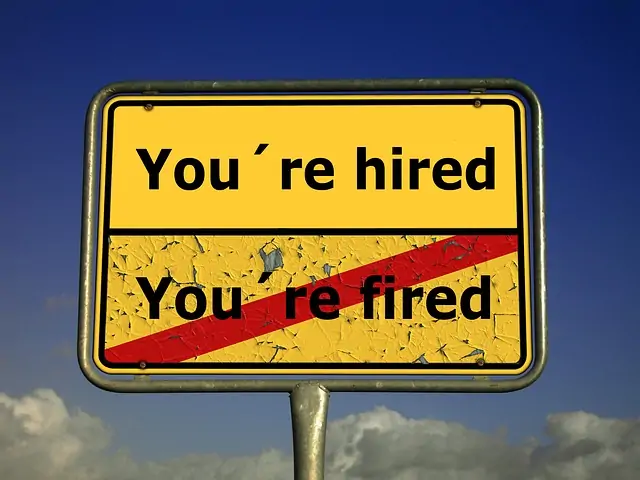This post contains affiliate links. It means that if you click on the links and make a purchase, we will receive a small commission at no additional cost to you. This allows our blog to continue providing you with free information. We only include links and products that we truly believe in. You can read the full disclosure here.
Have you ever had a job interview in Germany? It is not easy to find an English-speaking job, but it is possible. In this post, I am going to share with you the interview process in Germany, and also some tips on how you can increase your chances of getting a job.
Moving to Germany or new in Germany? Check out our Resources Page for all the help you need!
Interview in Germany – My personal experience
After I graduated with my master’s degree in Germany, I applied for a graduate position at an international company. I was invited to an assessment center, which lasted for 1.5 day. In the end, I got my permanent full-time job in Germany without speaking German.
Please keep in mind that the interview process can be different in every company. I am just sharing with you my experience. You may experience a different interview process in Germany depending on the companies and positions that you apply for.
Read also:
- Want to Work in Germany? Tips from Industry Experts
- How to write your CV in Germany (+ English template!)
- How To Write Your Cover Letter in Germany (+ English Example!)

Assessment center
Day One: Get to know the company + Networking chance
I was invited to the company for half a day in the afternoon. The HR person told me before that the interview would be conducted in English. There were 10 candidates in total, including me. We chatted a bit with each other at the reception, and I figured out that 8 of them were German. Only one girl there was non-German, but she could speak German as well. So, I was the only candidate there, who was not able to speak German. That was a bit scary for me.
We were invited to sit in a big conference room. Each of us did a brief self-introduction. Then, someone from HR did a presentation about the company and the position that they were hiring. In the end, there was a Q&A section. We were allowed to ask any questions. Someone asked, “How many of us are you going to hire for this position?”
“One.” was the answer from HR. I still remember that I saw the depressed faces on all the candidates, once we heard this answer. I was feeling the same as well. One out of ten! That was a 10% chance of getting hired. How could that be me? The chance was just so low that we were immediately demotivated.
Happy hour networking session
Following the presentation was a casual networking session. We were invited to have a happy hour gathering in the company’s canteen, together with HR and some senior managers. There were drinks and snacks. This was the chance for us to network with each other in a casual setup, before the real interview which would take place on the following day.
This was not really part of the interview. It was more like a “get to know each other” before the real interview. We chatted with each other casually about anything, like food, travel, study, etc. As I mentioned before, every candidate was able to speak German (except me). So, in this kind of casual session, everyone was talking in German. This put me in a really bad situation because I was not able to understand and participate in the conversation.

I was frustrated already after Day One
I tried very hard to capture some German words that I knew when they were talking. For example, when I heard the word “Hund” in the sentence, then I supposed they were talking about dogs. I jumped into the conversation and talked about dogs as well. I talked in English and hoped to switch the conversation language from German to English. That worked several times. But after a while, they started to talk in German again.
After my Day One interview, I was already very frustrated. I felt like there was no way I would get this job. I thought I must have given a bad impression during this happy hour session. Because I showed that I could not speak German, and I could not really network with anyone there. Even though English was the official interview language, I did not feel good about how my Day One interview went.
Read also: 20 Ideas to Make Money from Home that Anyone Can Do
Day Two: The real interview
On the next whole day, we started the real interview. The interview consisted of the below five parts:
Presentation
Some weeks before this interview, we were told that we had to do a presentation during the interview. So we had to prepare a PowerPoint presentation for 15 minutes. We could choose any topic we wanted.
The presentation was the first part of the Day Two interview. Every candidate had to present, followed by a Q&A session at the end of each presentation. The audience included all the candidates, HR, hiring managers, and other senior managers from the company. Since we were 10 candidates, it took a while until everyone was finished.

Group work
After the presentation, the second part of the interview was group work. We were divided into three groups. Each group was given a task to fulfill: to find a solution for a question and present the solution after 30 minutes.
For our group, everyone was given a piece of paper, with some information on it. We were not allowed to show each other directly what was in our paper. The information on the paper included words that were difficult to understand.
For example, the question for a group maybe something like: “How many XXX do we need to use in the production process to make YYY?”
One paper might state: “AAA is a combination of two BBB plus three CCC.”
Another paper might state: “To make YYY, we need to use one AAA.”
The last paper might state: “XXX is four BBB and six CCC.”
The real group work was more complicated than the above example. But this was basically the concept. Since we were not allowed to show each other directly what was stated in our paper, it was not easy to solve the question. And we had to work under time pressure and present the solution after 30 minutes.

HR Interview
This was an individual interview with an HR person. Most of the time, HR people do not have the technical knowledge for the hiring position. But very often, candidates would need to go through an HR interview as a first step to see if the candidates fit the company culture and the position.
For me, I found HR interviews quite easy in general. You can prepare for these typical questions beforehand like:
“Why do you apply for this position?”
“What is your strength and weakness?”
For this interview, the HR person also asked me:
“What do you think about your presentation just now?”
“Do you think you need to improve anything in your presentation?”

Technical Interview
This was an individual interview with some managers in the field. They asked me technical questions regarding the position that I applied for. To answer these questions, I had to use my knowledge from my study, my previous work experiences, and some common sense and creativity.

Interview withthe hiring manager
This was an individual interview with the hiring manager. This was the manager whom I would need to work with if I got the job. There were general questions, and also technical questions. Basically, it was up to the hiring manager what he wanted to ask me.
Since he would need to work with me if I got the job, he wanted to make sure that I was the right person to hire. He asked about my background, my study, my previous work experiences, etc. He also asked me about my German level and what I planned to do to improve my German. I had to convince him that I would learn German fast.

Result
Finally, the interview was over. I was relieved. It was quite an overwhelming day. I think I did well in the interview. However, there were also some other good people and it was only a 10% chance to get hired. After two days, HR informed me by phone that I got the offer. I was crying out from happiness!

6 Interview tips to land your dream job in Germany
(1) Read the website of the company and the job description
You should read the company’s website and try to understand the business as much as you can. Read the job description carefully again to understand the position. In the job description, they normally state the requirements. Think about how you can meet each of these requirements there. They will likely ask you in the interview: “Why should we hire you?” You need to be able to convince them why. Give examples of how you fit the requirements.

(2) Prepare questions before going to the interview
At the end of almost every interview, the interviewer will ask you if you have any questions. It is always good to ask some good and relevant questions. It shows that you are interested in the company and the job. You can already prepare some questions beforehand. For example, from reading the company’s website and the job description, you can probably think of some relevant questions there.

(3) Listen carefully when other people are talking
This is very important because it shows that you are interested. When you listen carefully, you may also think of relevant questions to ask later on. For example, during the presentation part, I listened carefully to the other candidates when they were presenting. This allowed me to think of questions to ask them during their Q&A session. When I asked a good and relevant question, it showed the others that I paid attention and could think critically.

(4) Do not dominate in group work
During group work, you are being assessed how you solve a problem and how you work with other people. It is tempting to become the focus and dominate the conversation. In reality, the interviewers do not prefer someone who is too dominating or someone who does not speak up at all. Being too dominating shows that you may not want to listen to other people’s opinions, or you cannot work smoothly with others. Instead, you should mention your points, and give other people their chance to express their opinions as well.
If someone is not speaking up, you may even invite him to talk. Simply ask him what he thinks or if he agrees with the decision. You may leave a good impression on the interviewers by doing this, as it shows that you care about other people when you work with them.

(5) Volunteer yourself to be one of the first to present
I can give you one example during the presentation part of my interview in Germany. The HR asked all of us: “Who would like to go first?” I think the best is to be the first or the second person to present. Why? Imagine if you were the interviewer, you would have to listen to ten presentations for at least 15 minutes each. How long is an average person’s attention span? Would you be as concentrated when listening to the 10th presentation, comparing to the first two presentations?
I know it is always a bit scary to be the first one. And I was not the first one. I observed during the first presentation, to see how it went, how the interviewers reacted, what were the general questions in Q&A, etc. Then, I volunteered to be the second one, before everybody got tired of listening.

(6) Stand out from the crowd
During the presentation part of my interview in Germany, every candidate could choose any topic they wanted to present. As I expected before, everybody chose to present a casual topic. For example, almost half of the candidates presented about their travel experience.
I was the only exception. I chose a topic which I could show some statistics. Why? Because I know that if I work in a company, I am not going to present about my travel experience. I am likely going to present something more technical, e.g. with graphs and numbers. I wanted to take this chance to show the interviewers my analytical skills, on top of my presentation skills. Besides, I chose a topic that was completely different from any others, which helped me to stand out from the crowd.
The topic I chose was the real estate situation in Hong Kong. It took me a long time to prepare for the slides, as I really did research and compared house prices in Hong Kong versus other cities. I also had backup slides which showed more statistics and the sources of my research.

So, these are some tips from my side based on my interview experience in Germany. Keep in mind that the interview format and style can be different in every company. I am just trying to share my own experience, which may hopefully help you.
Did you have any interview experience in Germany? What are your interview experiences? Leave a comment below and let me know!
[facebook-page-plugin href=”foreigneringermany/” cover=”true” facepile=”false” cta=”false” small=”true” adapt=”true” link=”true” linktext=”Follow me on my facebook page!” ]
Moving to Germany or new in Germany? Check out our Resources Page for all the help you need!
If you found this article helpful, consider supporting this website by buying me a coffee. Every small donation helps to keep this blog alive. You can also ask me any questions here. Buy me a coffee








Very interesting your experience in a place where the dominant group could be the native people. I have learned a lot after your process to get the job. I am about to move to Germany in a few months or so. I am nervous and excited as well because of getting a job in a place where I am fully naive with the language. I am applying to jobs from here my hometown before moving there if I have a chance to get the job but this is a lottery. No matter, I will and I am sure with my capabilities and skills I will tackle a job sooner or later. Thank you for sharing. Now I feel more confident to get a job in Germany with no German language skills.
Thank you for reading! As I mentioned in the article, it is possible to find English speaking job in Germany. But it is also very difficult. It depends a lot on your field. The best would be to learn German as fast as you can. You will need to learn Germany anyway when you want to live in Germany for longer. Good luck for your move and job hunting in Germany!
Thank you for sharing your interview experience, and I can relate to the difficulties of finding work in Germany. I’m living in Berlin for 9 months and have had interviews with a little under 30 companies. Some interviews have gone past the HR stage to in-person interviews with the hiring managers. I’ve been in final interviews 3 times but haven’t received a contract offer yet.
My entire 9 months have been applying to jobs, learning German and interviewing. My German level is about A2 level, as my current module ends in late May. I think my issue is not only knowing German on a basic conversation level, but also meeting the requirements of jobs that I may have an easier time in my home country (United States).
I know at some points of certain interviews I have some difficulty explaining how I can meet a certain requirement, but I’ve also felt comfortable at explaining my experience and how I can best bridge those gaps maybe in my previous experiences.
I’m searching now for different roles that maybe I have a better opportunity at getting, but I’m not sure if that’ll help. In the meantime, I’m continuing to learn German and applying and interviewing.
One last thing is, my work history doesn’t have many gaps. I was at a Fortune 100 company for 11 years previous to my move to Berlin, and before that was a 6 month gap of unemployment before working at another Fortune 100 company for 11 years as well.
So, i’m concerned now that my 9 months of unemployment will count against me. Thanks again for sharing your experience.
Best,
Rizzo
Hi Rizzo, thank you very much for sharing your experience. I think it helps a lot when you are able to handle at least basic conversation in German. It depends also on your field. For some technical fields, German is not as important. But for some others, it is extremely hard to find a job without speaking German. I think 9 months of unemployment is not too bad, if you show that you were using the time to move to Germany and take language course, for example. Maybe you can aim at American companies, or jobs that require native level of English. Hope it helps and good luck for the job hunting!
Hi Rizzo,
Could you please send me your profile and what are you looking for? The company I work for has openings also for those that do not yet speak German. My email address is [email protected].
All the best,
Cristian
I’ve only had telephonic interviews so far, and no luck. Sigh. You did a great job though!
This is so revealing. Thank u bro/sis for this
Hi Sindy, thanks for sharing your experience and suggestions! I can fully relate on how difficult and diverse the selection process can be in Germany, and how opaque and disconcerting it can be for a job applicant not to receive any sort of feedback about the application. In these circumstances, even getting to the interview stage is a massive achievement, meaning that your application was already read and assessed. So, to any job seeker: stay positive and determined, as the job search will take a LONG time and a lot of applications.
I’d like to comment a bit on point #4, not dominating the discussion during the interview. After several years in a Fortune 100 company where I also had the interviewer role, I firmly believe that nobody is doing themselves a favor if, during the interview, they try to behave in a different way than they normally would. The job offer will be made depending on the interviewer’s assessment if you are a good fit for the company and the role’s hard and soft skills, based on your behavior during the interview. What if you get the job, and then in day to day work you let your real self out? What if you restrained your dominant personality during the interview, but then you dominate every business meeting you participate in? That’s not going to be productive for you or for your colleagues, and your career in that company will suffer or be short-lived.
The purpose of the interview is to allow a presumably experienced interviewer to make a true assessment of your potential long-term success as a skilled individual inside the company. Any flaw in this assessment, either because of the interviewer’s failure to follow a methodology or assess correctly, or because of the candidate’s “false advertising”, will only be a waste of time and effort, and most likely lead to dissatisfaction.
If you observe yourself or frequently receive feedback that you tend to dominate discussions, it would be far more effective to work on this issue on a personal level and change it for EVERY discussion you participate in, not just in an interview. Such an effort will have a much better impact on your overall success, in interviews and daily job alike.
As for #6, I’m pretty sure that the presentation topic was what got you the job. Well done! This is not a test for your presentation skills, unless the job you apply for is to be a trainer. If you want to stand out, you could try to put yourself in your interviewers’ shoes. Learn about the context of the company and the industry, then try to guess a topic which might be of interest to them. Do your research, and come up with a presentation whose content would be meaningful to your audience. And don’t forget to ask for feedback – it shows that you want to listen, learn and improve yourself.
Thank you for your comment! I listed my point #4 here, actually because many people think that it is good to be dominating in group work, regardless of their own personality. Because they think that the more they talk/participate, the better is the performance. So, I wanted to point out that to be dominating does not mean to be a good performer. Because most of the time, companies want to hire people who can work well with the others in a team. As to myself, I am actually not a dominating person, so there was no need for me to restraint my personality. Thanks again for your insight! It is very informative to hear from the interviewer’s point of view!